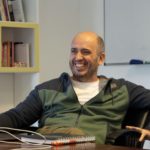Ever notice how our visions of the future often lean toward the bleak and gloomy? It’s like we’re all stuck in a never-ending loop of apocalyptic scenarios, with aliens, wars, and survivalism dominating our imaginations. But here’s the thing: why are we so fixated on the negative instead of envisioning a brighter future for us and the generations to come?
Dystopia gets all the hype. It just sells more. But maybe that’s because it’s easier for our brains to focus on problems than on solutions. I have this sneaky feeling that we tend to imagine dystopia and that we’re powerless to change course because it suits us better: we can’t do anything to prevent it (no work required on our end) and become less committed to creating better outcomes (what for, if new generations are always worse?). Even Aristotle was griping about younger generations way back in 470 BC!
In a way, it’s like we’re stuck in a cycle of negativity, in no small measure fed by the media all around us. We focus so much on the problems that we forget to channel our energy into solutions. It’s as if we’re constantly bracing ourselves for the worst, leaving little room for positive change. By giving dystopia all our attention, we end up feeling paralyzed, unable to take meaningful action. It’s time to break free from this cycle of fear and start investing our energy in solving the very problems we fear. And let’s face it, with no immediate threats to our hegemony as humans, there’s no better time than today to shift our focus toward building a brighter future.
I invite you to think outside the box. There are so many things we can do to transform dystopia into utopia, and I’m not just talking about lounging in the sun, strumming a guitar on a lush green lawn. Imagine a world where humanity works together, where everyone has equal access to opportunities, resources and respect, and lives up to their full potential. That’s the kind of utopia I’m talking about—not just sunshine and rainbows, but a genuine shift toward collective well-being.
As many things do, I think it all starts with the kids. Children may lack life experience, but they’re incredibly smart. By teaching them critical thinking and helping them challenge dystopian narratives healthily, especially through design, we’re planting the seeds for a brighter future: a generation of young minds empowered to create a better future and rejecting the mandate of dystopia.
Our biggest impact will come not from the digital products we create today, but from how many minds we can reshape. That’s what will make a difference 100 years from now. Believing we live in a world where we have the power to create a better future is part of this shift: even if the systems we live in are conducent to dystopia naturally, we can all contribute to turn them into utopia.
So, here’s my invitation to you: dare to dream of utopia. Challenge the status quo and set sail toward a better world. Together, let’s leave a legacy of hope, possibility, and positive change.
